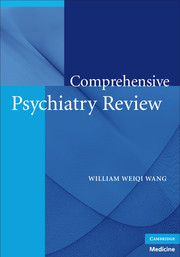Book contents
- Frontmatter
- Contents
- Introduction
- PART I INTELLECTUAL FOUNDATION OF PSYCHIATRY
- PART II EVALUATION AND MEASUREMENT
- PART III PSYCHIATRIC DISORDERS
- 10 Cognitive Disorders
- 11 Addictions: General Consideration
- 12 Addictions: Alcohol-Related Disorders
- 13 Addictions: Nonalcoholic Substance-Related Disorders
- 14 Psychotic Disorders
- 15 Mood Disorders
- 16 Anxiety Disorders
- 17 Somatoform Disorders
- 18 Dissociative Disorders
- 19 Sexual and Gender Identity Disorders
- 20 Eating Disorders and Weight Issues
- 21 Sleep Disorders
- 22 Factitious Disorders and Malingering
- 23 Personality Disorders
- 24 Child and Adolescent Psychiatric Disorders
- 25 Psychosomatic Disorders and Consultation-Liaison Psychiatry
- PART IV PSYCHIATRIC THERAPEUTICS
- PART V NEUROPSYCHIATRY AND RELEVANT NEUROLOGIC CONDITIONS
- PART VI SPECIAL TOPICS
- PART VII REVIEW QUESTIONS
- Bibliography
- Index
11 - Addictions: General Consideration
from PART III - PSYCHIATRIC DISORDERS
Published online by Cambridge University Press: 18 January 2010
- Frontmatter
- Contents
- Introduction
- PART I INTELLECTUAL FOUNDATION OF PSYCHIATRY
- PART II EVALUATION AND MEASUREMENT
- PART III PSYCHIATRIC DISORDERS
- 10 Cognitive Disorders
- 11 Addictions: General Consideration
- 12 Addictions: Alcohol-Related Disorders
- 13 Addictions: Nonalcoholic Substance-Related Disorders
- 14 Psychotic Disorders
- 15 Mood Disorders
- 16 Anxiety Disorders
- 17 Somatoform Disorders
- 18 Dissociative Disorders
- 19 Sexual and Gender Identity Disorders
- 20 Eating Disorders and Weight Issues
- 21 Sleep Disorders
- 22 Factitious Disorders and Malingering
- 23 Personality Disorders
- 24 Child and Adolescent Psychiatric Disorders
- 25 Psychosomatic Disorders and Consultation-Liaison Psychiatry
- PART IV PSYCHIATRIC THERAPEUTICS
- PART V NEUROPSYCHIATRY AND RELEVANT NEUROLOGIC CONDITIONS
- PART VI SPECIAL TOPICS
- PART VII REVIEW QUESTIONS
- Bibliography
- Index
Summary
Thomas Sydenham, the renounced English physician of seventeenth century, once said, “Among the remedies which it has pleased Almighty God to give to man to relieve his sufferings, none is so universal and so efficacious as opium.” Opium, as one significant example of addictive drugs, was in medicinal use since the Stone Age. Like opium, many other currently illicit substances were once accepted therapeutic agents. Addiction as a self-awarding behavior was first connected to compulsive indulging of habit-forming substance in the early twentieth century. Modern physicians no longer warship opium in the manner Sydenham did, as they understand a quick and powerful relief of suffering alone, without balancing other aspects of health, is not the destination of medicine.
The phenomenon of addiction subjected to extensive scientific investigation. At this time the biological mechanisms of addiction are not yet completely elicited. Key structural elements likely include amygdala, nucleus accumbens, pontine nuclei, arcuate, ventral tegmental area (VTA), prefrontal cortex, thalamus, and pallidum. Neurotransmitters, dopamine, and norepinephrine are most closely involved.
DSM-IV-TR allows fourteen diagnoses of substance-related disorders:
▶ Substance dependence
▶ Substance abuse
▶ Substance intoxication
▶ Substance withdrawal
▶ Substance intoxication delirium
▶ Substance withdrawal delirium
▶ Substance-induced persisting dementia
▶ Substance-induced persisting amnestic disorder
▶ Substance-induced psychotic disorder (including hallucinogen persisting perception disorder)
▶ Substance-induced mood disorder
▶ Substance-induced anxiety disorder
▶ Substance-induced sexual dysfunction
▶ Substance-induced sleep disorder
▶ Substance-related disorder not otherwise specified (NOS)
Abuse vs. dependence
▶ Abuse implies failure to fulfill role – failure of any one of these role meets the criteria of abuse
▶ As a worker (repeated absences, poor work performance)
▶ As a student (suspensions, expulsions from school)
[…]
- Type
- Chapter
- Information
- Comprehensive Psychiatry Review , pp. 81 - 83Publisher: Cambridge University PressPrint publication year: 2009



